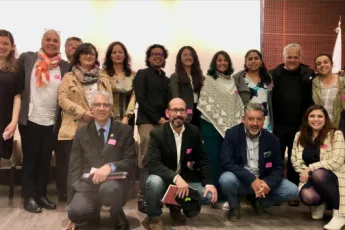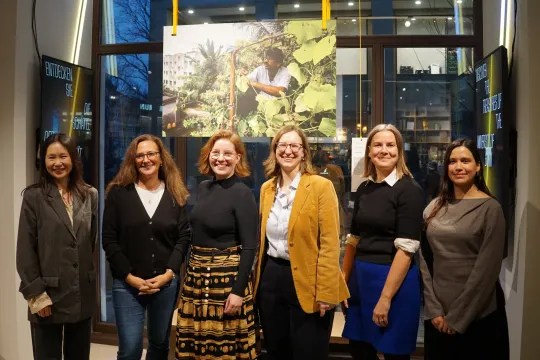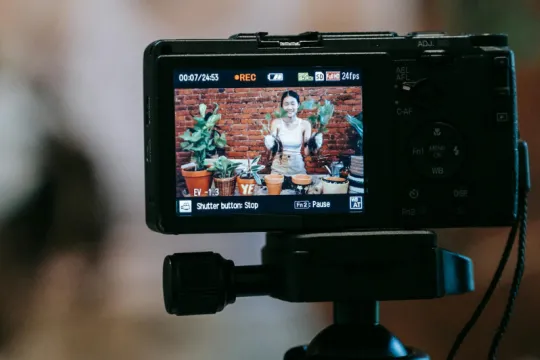
Dirk Wilutzky and the TUC team of WRI Mexico at the Mexican Senate. © WRI Mexico
The event “Partnerships for urban and socially responsible climate action from global and local perspectives” was held on 25 October at the Mexican Senate, highlighting the urgency of building cities that are resilient to climate change. Organized within the framework of TUC, it consisted of a panel discussion about the challenges involved in local climate action and the promotion of intersectoral dialogue, as well as the exhibition of two documentaries by Oscar-winning German filmmaker Dirk Wilutzky.
Senator Patricia Mercado, President of the Senate’s Metropolitan Zones and Mobility Commission together with the executive director of WRI for Mexico and Colombia, José Luis Samaniego, delivered the opening speeches. In her talk, Senator Mercado mentioned the devastation caused by the passage of hurricane Otis in Guerrero state on Tuesday and said that this event should guide the discussion about what can be done at the legislative level.
“(That leads us to ask ourselves) what we should do, so that such events do not give rise to tragedies, but situations for which we are better prepared,” she said, adding that she agrees with one of the people interviewed in the documentaries, who mentions that climate change is an opportunity for sustainable development. José Luis Samaniego highlighted the growing urbanization of Mexican cities, with 78 per cent of the territory urbanized, and the role of cities as major drivers of emissions and the place where vulnerability and exposure to climate risks have grown exponentially. “As we continue to urbanize, we can expect higher emissions and worse consequences,” he said. However, he assured that cities also represent an opportunity to confront climate change through compact urbanization models that contribute to the reduction of emissions, as well as the adaptation of urban spaces. “For this reason, we propose a denser urbanization model, where we not only promote the electrification of mobility, especially public transport, but we also intend to provide services and increase people’s well-being. Our participation in TUC is part of that effort, and we have created Urban Labs in which we try to increase the relevance of social participation,” he added.
Pablo Lazo, director of Urban Development at WRI, pointed out that films and documentaries are communication instruments that have the ability to transmit clear and powerful messages to large audiences and raise society’s awareness of key issues, such as how adaptation requires a joint effort and everyone’s involvement. “As you will see in the short films, the emergency is clear and specific, but the most important thing is that it implies changes in our ways of life […]. The fact is that we don't have much time, a decade perhaps, before climate change transforms the way we live in our cities”, he said. Furthermore, Lazo highlighted the work that is being carried out simultaneously in five Latin American cities, where an urban governance model has been built and strengthened through the installation of the Urban Labs of TUC. “The documentaries bring a brutally honest message, about the urgency to make changes and not wait any longer,” he concluded.
Filmmaker Dirk Wilutzky presented two documentaries that are part of the series "A True Paradise", produced for the TUC project and showing crucial dimensions of climate action from a global and local perspective. “The first thing I want to clarify is that I am not the only filmmaker; I produce everything with my wife Mathilde Bonnefoy, and we divide the work equally among us. The second thing I want to say is that we have a good reason for being here. I have been a filmmaker and producer for 20-30 years, and climate change and the future is of interest to me. I have a 5-year-old child, and I often wonder what we are doing, because there is a lot at risk for the new generations [...] It is an issue of climate justice, so what we did in these films was bring the people, the cities, to the same table where scientists, diplomats and other actors hold discussions”, he said.
The first film, "A True Paradise", showed that if we were to do all that needs to be done to tackle the climate crisis, it would be the same things we would need to do if we wanted to create a true paradise, as people would live in better and more just cities. The second film, "Voices On The Ground", was about brief portraits that illustrated changes in people's mindsets over time. In both films, a clock ticked in the background, reinforcing the feeling that we are running out of time to act.
After the film screenings, Senator César Cravioto stressed the importance of development, and how it serves as a starting point to think about sustainable development. “I really like the first part of the film, where the fundamental need to take a step towards social development to advance towards sustainability is discussed […] Of course, both efforts can go hand in hand, and we have to advance on both fronts, but I liked the approach of the first film. In terms of the Metropolitan Zones and Mobility Commission, I believe that progress can be made, and an example is that we were able to establish the general mobility law,” he said.
Pablo Lazo moderated the subsequent panel discussion, which focused on the generation of alliances that promote local climate action towards the decarbonization of cities, and on identifying solutions to key socio-environmental challenges through consensus that recognizes the co-responsibility between sectors.
Francisco Aguilar García, general director of urban, land and housing development at the Mexican Government’s Secretariat for Agrarian, Land and Urban Development (Sedatu), explained the conditions under which the urban improvement programme has been launched and implemented.
“We were faced with a widespread complexity resulting from policies of the last 15 years [...] we received a fragmented, segregated, exclusive country, so the vision had to be based on the idea of integration. We needed to recognize those of us who are on the front line, and those who are further behind. In this context, the neighbourhood territorial improvement programme emerged. I think that in five years of government, it is worth highlighting that we have worked by means of alliances. They included actors from civil society, international cooperation initiatives, and different local groups."
Representing the Naucalpan City Council, Óscar Zarate spoke about the main challenges of this space for dialogue mentioned in the documentaries, in terms of addressing climate change on a local scale. He explained that Naucalpan has a climate action plan created in 2013, and that tackling social issues requires a space where actors can dialogue and become more active and engajed in the communities. He said that urgent local actions made them realize the importance of interacting with the communities, and their need to connect with the metropolis. “For us, the experience has taught us to act locally and think globally,” said Zarate.
Andrea Ramírez, Associate Academic Officer of the United Nations University Institute for Environment and Human Security, closed the session by announcing that they will take this conversation to COP28, where they will present what has been done in the cities where the Urban Labs have been established.
The event brought together civil society organizations, academia, community leaders and representatives of the state and municipal governments, active members of the TUC project’s Naucalpan Urban Lab, implemented by WRI Mexico with the support of the German government’s International Climate Initiative (IKI).
At TUC's Urban Lab sessions, the aim is to identify actions that mitigate climate change, increase resilience and reduce inequalities in the five Latin American cities in which they are established. In Mexico, the participating cities are Naucalpan and León. In these cities, WRI Mexico implements the TUC project to improve environmental and social conditions within the transformation polygons collectively delimited during Urban Lab sessions. Through consensus and collaborative work, a common vision and an action plan have been defined, leading to the implementation of short-term, low-cost actions in the territory. These actions allowed the team to test solutions that could contribute to mitigating climate change, increasing resilience and reducing inequalities.
With the management and implementation of these actions, TUC comes to the end of its first phase, contributing solutions to tackle the climate justice challenges faced by Naucalpan and León, and ready to continue working strategically at phase II of the project.

